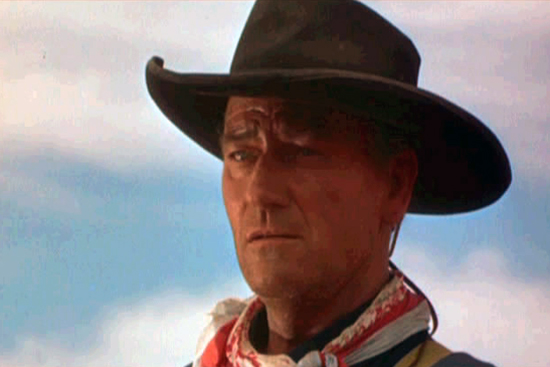Exploring Facts and Myths Behind a Hollywood Classic
Pulitzer-winner to discuss The Searchers tonight at CGS

On a spring day in 1836, a band of Comanche raiders murdered a group of pioneer families living on the frontier in east Texas. Among the survivors was nine-year-old Cynthia Ann Parker, who along with four other people was kidnapped and raised by the Comanches. Her uncle spent the next eight years searching unsuccessfully for her. But in 1860, during the Battle of Pease River, a group of Texas Rangers and US Cavalry attacked an Indian encampment in North Texas and discovered Parker, who had married a Comanche warrior and was raising three children. Once again, she was kidnapped, but this time she was returned to her original family—against her will.
Parker never adjusted to life apart from her husband and the two sons she was forced to leave behind (she was allowed to take her infant daughter with her). She became a short-lived celebrity, but died in obscurity several years later, heartbroken over the death of her daughter. Parker’s life would have been relegated to a footnote in history if not for her uncle James’ relentless and well-publicized search for her, and for another, later, search for her by her Comanche son, Quanah, who became a chief of the Comanches and went on to settle in Oklahoma. Parker’s story, kept alive through the decades, was the inspiration for Alan Le May’s 1954 best-selling book The Searchers, which in 1956 was adapted as a film of the same title, directed by Academy Award winner John Ford and starring John Wayne as Cynthia Ann’s uncle.
The making of Ford’s masterpiece and the real story behind it are the subject of Pulitzer Prize–winning journalist Glenn Frankel’s latest book, The Searchers: The Making of an American Legend (Bloomsbury, 2013). Frankel, a longtime Washington Post reporter, now the G. B. Dealey Regents Professor in Journalism and director of the School of Journalism at the University of Texas at Austin, explores the many ways Parker’s story has been “retold, reimagined, and embroidered,” he says, over the decades to fit each generation’s needs and sensibilities.
Frankel will discuss Parker’s story and the history and myth behind Ford’s monumental film today at a lecture and book signing sponsored by the College of General Studies and the Center for Interdisciplinary Teaching & Learning (CITL) at 4 p.m. at CGS. He will be introduced by Kevin Stoehr (GRS’96,’97), a CGS associate professor of humanities and the author of Ride, Boldly Ride: The Evolution of the American Western, with a foreword by Clint Eastwood.
“Glenn’s presentation will deal with the fascinating ways in which history, myth, and art helped to shape each other throughout the many incarnations of this very American story,” says Stoehr. “It is a perfect topic for the CGS Center for Interdisciplinary Teaching & Learning, since Glenn’s book is interdisciplinary in the best sense of the term.”
BU Today spoke with Frankel about his book, which the New York Review of Books says is “a powerfully suggestive book,” and film historian Jeanine Basinger describes in her Washington Post review as a “fascinating journey from fiction to fact, from glorified legend to brutal event.”
BU Today: How old were you when you first saw The Searchers and how did it strike you at the time?

Frankel: I first saw it at the RKO Palace in Rochester, N.Y., when I was seven years old. And I saw it at Columbia University a dozen years later, when it was shown by the great auteurist film critic Andrew Sarris. And I was moved by it each time. It was beautiful and powerful and unsettling. Even the gunshot sounds seemed sharper and more authentic.
You set out to write about the making of the film, but when you learned about the actual events that inspired it, the book became something different. Can you talk about that?
I knew the making of the film—John Ford, John Wayne, Monument Valley—would make for a compelling making-of-the-movie book. But when I discovered that the Parker family still existed and that Cynthia Ann and Quanah’s Comanche and Texan heirs held annual family reunions, I knew I had to go. And people were so nice and generous with their knowledge and support, and they had such wonderful stories to tell about their ancestors, I knew I’d stumbled upon something special.
When I bought the 50th anniversary version of the DVD and watched the wonderful documentary by Nick Redman, A Turning of the Earth: John Ford, John Wayne, and The Searchers, that accompanied the film, screenwriter and director John Milius referred to the original tale of Cynthia Ann Parker. With two or three clicks of the mouse, I found her and her Comanche son Quanah.
What is it about Parker’s story that captivated—and continues to captivate—the public’s interest?
It’s the characters and the circumstances. A little girl ripped from her family during a massacre of her family and hauled off by Indians to the wilderness and a new life, then captured again 24 years later and dragged back to the white world. And her surviving Comanche son’s search for his white mother and his own identity. All of it set against the backdrop of a brutal 40-year war, the longest ever fought on American soil.
A critic reviewing your book wrote that you wanted “to get at larger truths about American mythmaking.” What are you saying about how we create myths?
We create myths and make up “facts” to explain ourselves to the world and explain the world to ourselves. In Cynthia Ann’s case, members of her family began telling her story in a self-justifying way almost from the day she was captured. Survivors of the original raid claimed that hundreds of Indians had descended on their little settlement—this was their way of explaining why they failed to protect Cynthia Ann and the other four young people who were captured with her. Her uncle James, who searched for her and the others over eight years, wrote a personal narrative depicting his “perilous adventures” in heroic terms and blaming others for his failures. Sul Ross, the Texas Ranger captain who helped restore her to her Texan family after 24 years, later claimed to have won a glorious victory against overwhelming odds and to have killed Cynthia Ann’s warrior-husband, although there’s much evidence to the contrary. Even Comanche oral legend boasts its own romantic version. Fact and fiction are heated in the same crucible and blended together to emerge as something else.

A good half of your book is an account of those involved in shooting the film, notably John Ford and John Wayne. What surprised you most in researching Ford?
There’s a fundamental sadness at the core of Ford’s life and work that surprised me somewhat. For all his achievements and success, he was a troubled and restless soul who felt undervalued and misunderstood. He was a lifelong alcoholic who preyed upon those who loved him, and even those he most admired, like John Wayne, who was his favorite protégé. I don’t want to overanalyze this, but there may have been a well of self-hatred in his soul. He was a great artist—and a very troubled man.
The original reviews of a film today considered a classic were mixed. In the New York Times, Bosley Crowther called it “a rip snorting Western…that has the toughness of leather and the sting of a whip,” but many critics were dismissive. How did perception of the film change and why?
Early reviewers missed the complex racial and gender issues that the film raised. Perhaps it took a generation more attuned to the civil rights movement and women’s rights issues to pick up on these themes. Also, a new generation of filmmakers—led by people like Scorsese, Spielberg, and Lucas, who first saw the film as youngsters—have championed it as a seminal work of American cinema. Film studies and American studies programs at colleges and universities have found in it a rich mix of ideas and themes. And while the western has declined as a popular genre, I think we’re more prepared to treat older westerns as serious art and to honor filmmakers like Ford and actors like John Wayne.
Why do you think so many now regard The Searchers as the finest western ever made?
Despite all his personal setbacks, Ford rose to the height of his creative powers in The Searchers. He is responsible for the film’s visual poetry—its skill in moving from the intimacy of domestic interiors and family life to the terrible beauty of the gothic sandstone cathedrals of Monument Valley. And he is responsible for the film’s deep and passionate emotions.
Also, every time John Ford has the opportunity, he reduces or eliminates altogether dialogue and exposition, substituting lyrical ambiguity for verbal clarity. And I think the consistent discipline of Ford’s visual narrative decisions may be the most important key to the movie’s greatness. Finally, John Wayne’s performance is superb—one of the greatest in movie history.
The film ends with Parker being repatriated to her original family. Why did Ford choose to ignore the tragic final coda of her story?
Ford wasn’t much interested in Cynthia Ann herself (nor was Alan Le May, who wrote the novel the movie is based on). He was interested in the two men committed to finding her and in the impact of the violence on her family and the frontier community they were part of. Her story, coda and all, would have been a very different movie.
Your Washington Post reporting about Israel and the first Palestinian uprising won a Pulitzer, and your previous books explored the relationship between Jews and Arabs in the Middle East and Afrikaners and blacks in South Africa. Does this book share anything thematically with them?
In South Africa and Israel, I was writing about opposing nations fighting over land and hegemony: white Afrikaners vs. Black Africans and Arabs vs. Jews. Historical analogies are dangerous, because they often conceal more than they reveal, but the Texan-Comanche war felt like it had a somewhat similar dynamic: two nations locked in lethal combat in a war in which families and children were often not just the inadvertent victims, but targets and participants themselves. In Texas I felt like a foreign correspondent, parachuting into their 19th-century struggle just like I’d parachuted into southern Africa and the Middle East. In each case, I was a stranger and an outsider on a mission to understand what had happened and faithfully record the terrible human price both sides had paid and inflicted. There are advantages and disadvantages to being the outsider—you’re ignorant and need to study and watch for a long period just to begin to grasp the magnitude and details, but at the same time you have a fresh set of eyes and no need to choose sides.
Glenn Frankel will discuss his book The Searchers: The Making of An American Legend today, Thursday, February 6, at 4 p.m. at the College of General Studies, Room 511, 871 Commonwealth Ave. The lecture and discussion will be followed by a book signing. The event is free and open to the public.

Comments & Discussion
Boston University moderates comments to facilitate an informed, substantive, civil conversation. Abusive, profane, self-promotional, misleading, incoherent or off-topic comments will be rejected. Moderators are staffed during regular business hours (EST) and can only accept comments written in English. Statistics or facts must include a citation or a link to the citation.